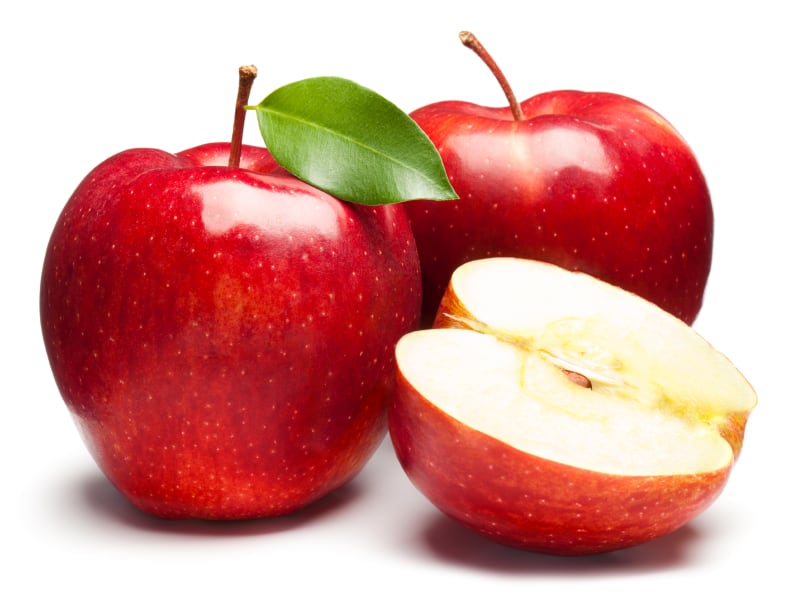Along with Italian colleagues, the research team believe the consumption of two apples a day in the diet can improve CVD risk factors and reducing total and low-density lipoprotein (LDL) cholesterol.
“Our findings show clear cause and effect between two Renetta Canada apples into normal diets and improved CVD risk factors, by reducing total cholesterol (TC), LDL cholesterol, and increasing microvascular vasodilation, in healthy subjects with mildly raised serum cholesterol concentrations,” the team says.
“Dose- and structure-response studies are necessary to explore the potential mechanisms, which are likely to involve bile acid (BA) signalling and/or small phenolic acids derived from apple polyphenols, both linked to gut microbiota metabolism.”
The randomised, controlled, crossover trial, which featured in The American Journal of Clinical Nutrition, received a mixed response from fellow academics, who point to the study’s short duration and size as two drawbacks to the research.
Results not definitive
“The trial, whilst well designed, was relatively small in size and short in duration and measured many things, so I would not say these results are definitive,” says Naveed Sattar, professor of metabolic medicine at the University of Glasgow. “Larger, longer studies are required to confirm and should be done.”
“The results of this study are of interest – any simple dietary changes that help lower cholesterol are to be welcomed, even if the reduction is relatively modest at around 4%, which is not sufficient to treat high cholesterol in many people at elevated risk of heart disease.”
The study looks at apples as a source of polyphenols (typically 110 milligrams per 100 grams (mg/100 g)) and fibre (typically 2–3 grams per 100 grams (g/100 g)), which may be responsible for the potential health effects.
The polyphenol proanthocyanidin (PA) and flavanol monomers, contained within apples, have been shown to lower serum cholesterol, raise HDL cholesterol, inhibit LDL oxidation, activate endothelial nitric oxide synthase, prevent platelet aggregation, and block inflammatory responses in atherosclerosis.
Meanwhile pectin, the main soluble fibre found in apples, is reported to affect transit time, gastric emptying, and nutrient absorption, affecting lipid and glucose metabolism.
Pectin also appears to modulate the gut microbiota, a key determinant of bile acid (BA) chemical structure and thus signalling potential.
Study details
The trial took healthy mildly hypercholesterolemic volunteers (23 women, 17 men), with a mean body mass index (BMI) of 25.3 kilograms per metre squared (kg/m2) and a mean age of 51.
They were asked to consume two Renetta Canada apples per day or a sugar- and energy-matched apple control beverage (CB) for eight weeks each, separated by a 4-wk washout period.
Fasted blood was collected before and after each treatment. Serum lipids, glucose, insulin, bile acids, and endothelial and inflammation biomarkers were measured as were microvascular reactivity, and arterial stiffness.
The team found whole apple (WA) consumption decreased TC levels (WA: 5.89 mmol/L; CB: 6.11 mmol/L), LDL cholesterol levels (WA: 3.72 mmol/L; CB: 3.86 mmol/L) and triacylglycerol levels (WA: 1.17 mmol/L; CB: 1.30 mmol/L).
The response to endothelium-dependent microvascular vasodilation was greater after the apples [WA: 853 perfusion units (PU), CB: 760 PU] than after the CB, with the team also finding the apples having no effect on blood pressure or other CVD markers.
“A total of 990 mg polyphenols per day was provided by two Renetta Canada apples in our study, which supports the hypothesis that polyphenols play a role in cholesterol lowering,” says the study.
“The daily intake of soluble fibre in the apple group in our study was 3.7 g. This amount might not be sufficient alone to lower TC and a major role of polyphenols, especially PAs, and/or a synergetic effect between apple polyphenols and pectin/soluble fibre cannot be excluded.”
“Improvement in vascular function has been mainly shown with a high daily dose of flavonoid monomers,” the team adds.
“The lower daily intakes of flavanol monomers in our study suggest a potential role for the apple PAs.
Swap statins for apples?
Prof Tim Chico, professor of cardiovascular medicine and honorary consultant cardiologist at the University of Sheffield, was restrained with his thoughts adding, “This study did show that eating two apples a day led to a slight reduction in cholesterol compared with an apple drink”.
“The effect on cholesterol was very small compared with drug therapy with statins, and so it is not clear whether this effect would lead to a decrease in heart disease or stroke.
“However, the study was over a short period and any benefits are likely to accumulate over a lifetime of a healthy diet,” Dr Chico adds.
“So, can people who need to take statins swap them for apples? No, not on the evidence of this study.
“Should all people (whether on statins or not) eat more vegetables and fruit if they want to reduce their risk of heart disease? Emphatically yes, alongside taking more regular physical activity, not smoking, and maintaining a healthy weight.”
Source: The American Journal of Clinical Nutrition
Published online: doi.org/10.1093/ajcn/nqz282
“Two apples a day lower serum cholesterol and improve cardiometabolic biomarkers in mildly hypercholesterolemic adults: a randomized, controlled, crossover trial.”
Authors: Athanasios Koutsos et al.




